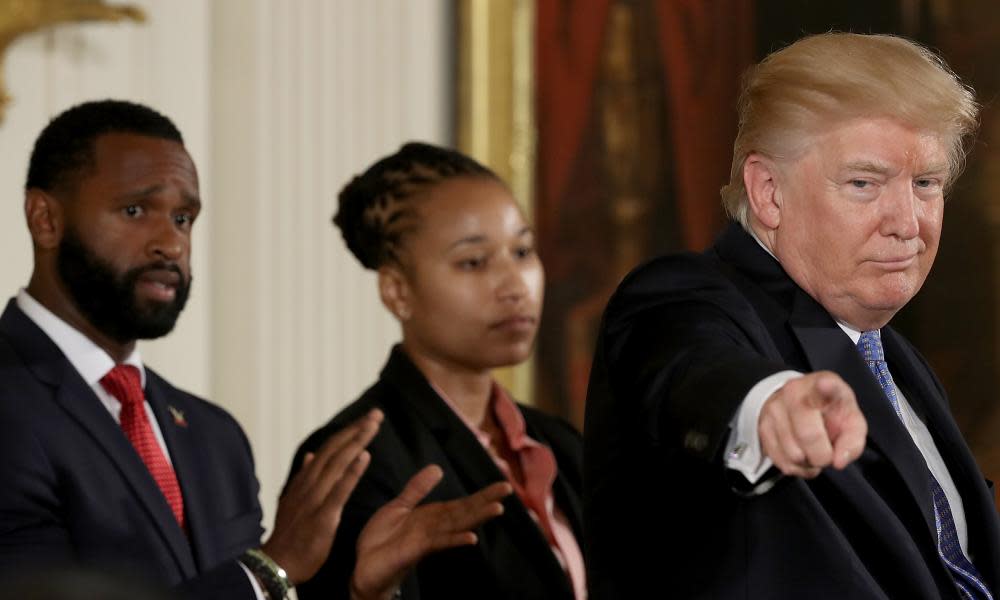The world's challenges can't be solved by so-called heroic leaders

Leaders such as the US president, Donald Trump, or Turkey’s Recep Tayyip Erdoğan may claim they can fix what ails their societies, but the dangers of a “heroic” leadership mode become clearer all the time.
The most important problems facing the world, including poverty, climate change and national security, have now expanded beyond the competencies of any single individual, organisation or sector.
Trump may claim, as he did on his campaign trail, that he alone
“can fix it” but that is refuted by scores of community activists, public servants, business people and even military commanders, who recognise the power of shared or collective leadership exercised at many levels by diverse people and across all sectors – business, nonprofit, government and community.
Heads of state cannot fix the world’s problems. They can, however, spin dangerous, anti-democratic myths about the need to concentrate power in particular individuals and groups.
Human beings naturally yearn for simple answers to complex problems. We would like somebody to fix things and take care of us. We are drawn to personal and accessible symbols and slogans – such as let’s make America great again – and are put off by faceless organisations and networks.
We respond to easily understandable stories that can make sense of a complicated world and are more likely to listen to a kindly, entertaining or authoritarian parent figure than to nerdy experts with data and facts.
But answers to complex problems are not simple. Those who seek to counter these natural tendencies and promote democratic, sustainable remedies to pressing problems must begin by recognising that today’s governments operate in a world in which power is shared and no one is wholly in charge. To address common problems means activating the resources and energies of many groups and types of organisations.
In the US, most of the federal government’s work of creating public value is carried out by the financing and regulation of networks that can accomplish what government cannot do alone.
States and cities also often rely on networks to address public needs. In our city of Minneapolis, leaders from business associations, faith networks, and nonprofit organisations have joined government officials in an ambitious effort over the past decade to eliminate homelessness. Working within a jointly-developed policy framework, these leaders and a host of committed constituents have made notable progress in housing veterans, LGBT youth, ex-offenders, families and other groups. We and other researchers have found that such partnerships work well when formal and informal leaders develop flexible ways of collaborating and adapting to local conditions.
In California, the California Endowment has undertaken a building healthy communities initiative that brings together more than 2,000 community leaders to tackle complex causes of poor health. In the Danish municipality of Gentofte, elected officials have established task committees in which they work with citizens to tackle the city’s most pressing problems. In Bristol, the mayor recently launched City Office, which, among other things, has set up an innovation zone where community leaders and government officials can collaborate on remedies for growing inequality in the city.
Examples such as these were highlighted at a conference in April of the public and political leadership network, held at the Open University. Scholars and practitioners are now identifying the kinds of skills that promote collaborative, shared leadership, rather than an individualistic, autocratic one.
These skills include political astuteness, convening ability, facilitation, relationship building and evidence-based learning, as well as story-telling about collective achievements and future possibilities. Whether we are elected leaders, the heads of businesses or nonprofits, or academics, these are the skills we can use to appeal to humans’ desire to leave their comfort zones and take responsibility for their lives and communities.
John Bryson and Barbara Crosby are faculty members of the Humphrey School of Public Affairs at the University of Minnesota and authors of Leadership for the Common Good: Tackling Public Problems in a Shared-Power World.
Sign up for your free Guardian Public Leaders newsletter with comment and sector views sent direct to you every Thursday. Follow us: @Guardianpublic
Looking for a job in central or local government, or need to recruit public service staff? Take a look at Guardian Jobs.

 Yahoo News
Yahoo News 
